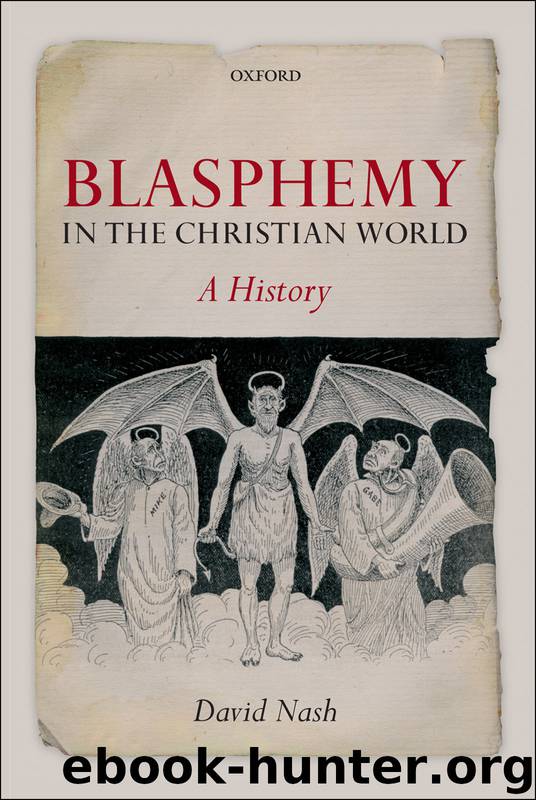Blasphemy in the Christian World by Nash David;

Author:Nash, David;
Language: eng
Format: epub
Publisher: Oxford University Press
Published: 2007-03-15T16:00:00+00:00
5
Controlling the Profane
This chapter attempts to investigate how societies have striven to cope with and control the blasphemer. It investigates the laws and edicts as well as the punishments which western societies have considered appropriate to and suitable for this crime. The Bible gave western societies an important example which legislators and theologians relied upon in the creation of a modern offence of blasphemy. The people of Israel had been chosen by their God, who aimed and directed the lives of his people, and their obedience and worship was expected accordingly. To this community, denying God, or more importantly even profaning him and his name, appeared to be a form of behaviour that lacked meaningful logic. Such an individual, in dishonouring God dishonoured the community.
The worship of false idols was not originally considered to be the offence of blasphemy, since it appeared to be grounded in the nation’s identity and relationship with its deity. This instilled a deeper reverence for the nature and the name of God, so that to even speak his name was an especial type of offence. Interestingly, its threat to the stability of the whole community made this a public offence, tried and punished amid ceremony and ritual tearing of garments to mark the retelling of the blasphemy in court. The offence of blasphemy was explicitely that the name of God had been taken in vain. Individuals convicted of this offence were to be summarily executed through the biblically prescribed punishment of stoning.
Such a view made the community take part in restoring honour to their deity, and was a defence of the sacred rather than a defence of specific beliefs. Leonard Levy has highlighted the distinction between this view and the later view in the West, that blasphemy was a disturbance of the civil peace and security. He goes as far as to say that the Judaic approach constitutes a road not taken in the West. Certainly the suggestion is intriguing when considered alongside the West’s later developed conception of a social and cultural offence. The Judaic conception of blasphemy identified blasphemers as being beyond the community of which they had previously been offered privileged membership. This dishonour would lead to God breaking his bond with his people unless dissident voices were silenced. If Levy is right, then the West supposedly lay much less emphasis upon the power of God to intervene, instead seeing remedies and punishments as being almost wholly within the realm of men.
However, much of our evidence suggests that the divide Levy argues for is, to a great extent, illusory. The resilience of popular belief in God’s capacity to intervene is a particular feature of blasphemy in the West. We noted in Chapter 1 a number of instances in early modern Europe where the audience for blasphemy and the community at large still believed the almighty was capable of intervening in human affairs to punish those present. Certainly, in the seventeenth century some cases involving soldiers, sailors, and gamblers suggest that the providential intervention of God was considered an omnipresent possibility.
Download
This site does not store any files on its server. We only index and link to content provided by other sites. Please contact the content providers to delete copyright contents if any and email us, we'll remove relevant links or contents immediately.
The Gnostic Gospels by Pagels Elaine(2420)
Jesus by Paul Johnson(2252)
Devil, The by Almond Philip C(2230)
The Nativity by Geza Vermes(2134)
The Psychedelic Gospels: The Secret History of Hallucinogens in Christianity by Jerry B. Brown(2083)
Forensics by Val McDermid(1989)
Going Clear: Scientology, Hollywood, and the Prison of Belief by Lawrence Wright(1894)
Going Clear by Lawrence Wright(1882)
Barking to the Choir by Gregory Boyle(1738)
Old Testament History by John H. Sailhamer(1719)
Augustine: Conversions to Confessions by Robin Lane Fox(1701)
The Early Centuries - Byzantium 01 by John Julius Norwich(1663)
A History of the Franks by Gregory of Tours(1645)
Dark Mysteries of the Vatican by H. Paul Jeffers(1619)
The Bible Doesn't Say That by Dr. Joel M. Hoffman(1614)
A Prophet with Honor by William C. Martin(1611)
by Christianity & Islam(1568)
The First Crusade by Thomas Asbridge(1546)
The Amish by Steven M. Nolt(1496)
